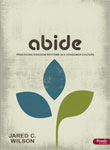Have you ever seen a “Buddy Jesus”? I remember seeing one for the first time on a shelf, and finding myself both laughing hysterically and being utterly disguisted at the same time. I mean…seriously…who thinks of these kinds of things?
 In Jared Wilson’s book, Your Jesus is Too Safe, he confronts head-on the idols that we have made out of Jesus. Not always physical, Buddy Jesus idols, but dangerous, joy-robbing, and soul-stealing nonetheless. You may be worshiping a false Jesus and not even know it. Scary, right?
In Jared Wilson’s book, Your Jesus is Too Safe, he confronts head-on the idols that we have made out of Jesus. Not always physical, Buddy Jesus idols, but dangerous, joy-robbing, and soul-stealing nonetheless. You may be worshiping a false Jesus and not even know it. Scary, right?
I had a conversation just the other day with a person who said (sorry, I won’t tell you what church they go to), “It’s fine that some people follow Christ, and find God through him. But others find God through many different paths. And some people don’t call Him God. They may call Him ‘purpose,’ or ‘science’ or ‘energy.'” There’s not enough room to address each of these here, but suffice it to say that if you don’t know the Jesus of the Bible, you don’t know God. (John 14:6-9) And Wilson clearly lays out who the Jesus of Scripture is.
Who is Jared Wilson? Think: John Piper meets Mark Driscoll meets Matt Chandler meets your-best-friend-who-shoots-straight-with-you-and-doesn’t-feel-bad-about-it. I was struck by the accessibility of Wison’s theology. His dry wit makes theology fun and inviting (as it should be). Stuffy professors have the tendency to teach a dry, lofty, intellectual theology. I’ve been through seminary. I’ve read the books (well…most of them). This would have been one of my favorites. He brings theology to the level where most of us operate, and will make you laugh while he’s explaining things that are so often alliterated with 4 J’s…or O’s…or Q’s. Instead of dozing off because you’re bored, you’ll find yourself drawn into knowing more and more about the true Jesus.
Who do you say that Jesus is? (p. 264)
I wanted to ask Jared a few questions so you could get to know him, his heart, and his wit just a little bit more, and hopefully be compelled to pick up a copy of his book.
1. The whole premise of your book is that the Jesus we are following is not the Jesus of the Bible. That is offensive to some people, because basically you’re telling them that they’re believing and following the wrong Jesus. How might somebody know that they’re following the wrong Jesus?
When you wake up and it turns out Jesus likes and dislikes the same things and people you do, you’re Jesus is too safe.
Or, if you read what he said and did in the Gospels and never think either a) That freaking scares me to death, or b) That blows me away, you’re Jesus is too safe.
If knowing the cost he paid for the debt we owed never thrills and breaks us, he’s too safe.
2. Why is it that we are so easily duped into believing and following false Jesuses?
Short answer is sin, of course. The long answer is that we are always worshiping. That “worship” switch inside us is never flipped to the Off position, so we just keep worshiping, keep moving like sharks in the ocean. So because we’re still exercising the worship impulse — and we’re going to church each Sunday — we think we’re worshiping Jesus, when really we could be worshiping our own self-esteem or the approval of others or success in our life or comfort or convenience or whatever, but it all has a Jesus sheen on it.
We drift into idolatry easily and quickly and subtly. This is why God is constantly spanking the Israelites. It just happens. And it just happens to us because idolatry is in our hearts.
3. Too safe? My Jesus is “too safe?” What does safety have to do with anything?
Because “Deny yourself, take up your cross, and follow me” is the epitome (x3) of danger.
4. Your humor regularly comes through in the book. Isn’t theology one of those things we should be more serious about?
Yes. I tried to make the humor in the book more the window dressing than the furniture in the room, and further, to have it more about taking ourselves less seriously and God moreso. But I’m also a sarcastic dork, so I couldn’t write it and not have that come out.
5. You talk a lot about who Jesus is in the book. Does it really matter what we believe? I mean, shouldn’t Christians be all about “doing” and stop “thinking” so much?
Yes, if you think there won’t be people who say to Jesus at the judgment “We did x, y, and z for you” to whom he says in response, “I have no idea who you are.”
The “doing without thinking” thing is precisely what leads to self-righteousness.
This week I’ve begun a series through Colossians at our church, and one thing that has sort of struck me for the first time as I prepare, is that Paul’s letters, which are full of practical exhortations and behavioristic commands, nearly always begin with some hard core doxological proclamation of the gospel. Philippians has it, Ephesians has it, Colossians has it. And it’s sort of like, for Paul’s writing, the gospel is huge at the introduction in order to provide the momentum for the hills and valleys of the practical stuff. The gospel has to be the thing that pushes us, propels us, carries us through, like the first big drop of a roller coaster. Or else we end up thinking life is all about the little “doings” and, worse, that we’re doing those “doings” under our own power.
6. When you wrote this book, did you write it for mature believers, immature believers, seekers, children, adults? Who was your target audience?
It’s for people who need to hear about Jesus and the gospel, which I think is everyone, Christian and non. But I know you’re not supposed to market a book that broadly.
The book does assume a certain working level of Christianity, and it does sort of assume that the reader is interested in deepening his or her understanding of what Jesus said and did. It assumes the reader has “a Jesus” that may or may not need clarifying.
And given the pop cultural references, the humorous footnotes and the sarcasm and what-not, it is probably most in the language of Christians 18-40 or so.
7. Have you found yourself ever following a “safe” Jesus?
Yes. For the first 30 years of my life without knowing it. And then every day for the last 3 years or so, except now when I do it, I usually know that I am.
8. The Bible is the greatest selling book of all time. Do you think “Your Jesus is too Safe” will eclipse the Bible’s sales? How soon do you predict that will happen?
By my calculations, it will be sometime in 2013, but since the apocalypse foretold by the Mayan Calendar occurs before that, I won’t get to do any blasphemous victory dances.
For more reviews of Your Jesus Is Too Safe, and additional interviews with the author Jared Wilson, please visit Jared Wilson’s blog, The Gospel-Driven Church, for blog tour links.




